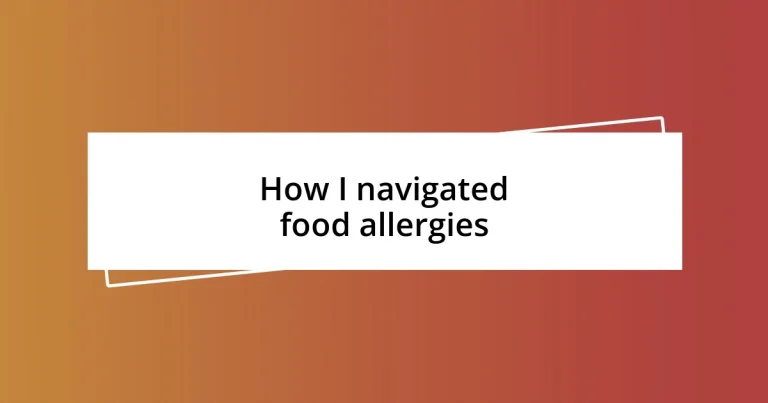Key takeaways:
- Understanding food allergies involves recognizing that the immune system mistakenly identifies harmless substances as threats, leading to varied reactions and the need for open communication about these challenges.
- Identifying personal triggers through careful tracking of food intake and reactions empowers individuals to make informed dietary choices and advocate for their health.
- Building a support network, both personal and online, along with having strong communication with healthcare professionals, is crucial for managing food allergies effectively.
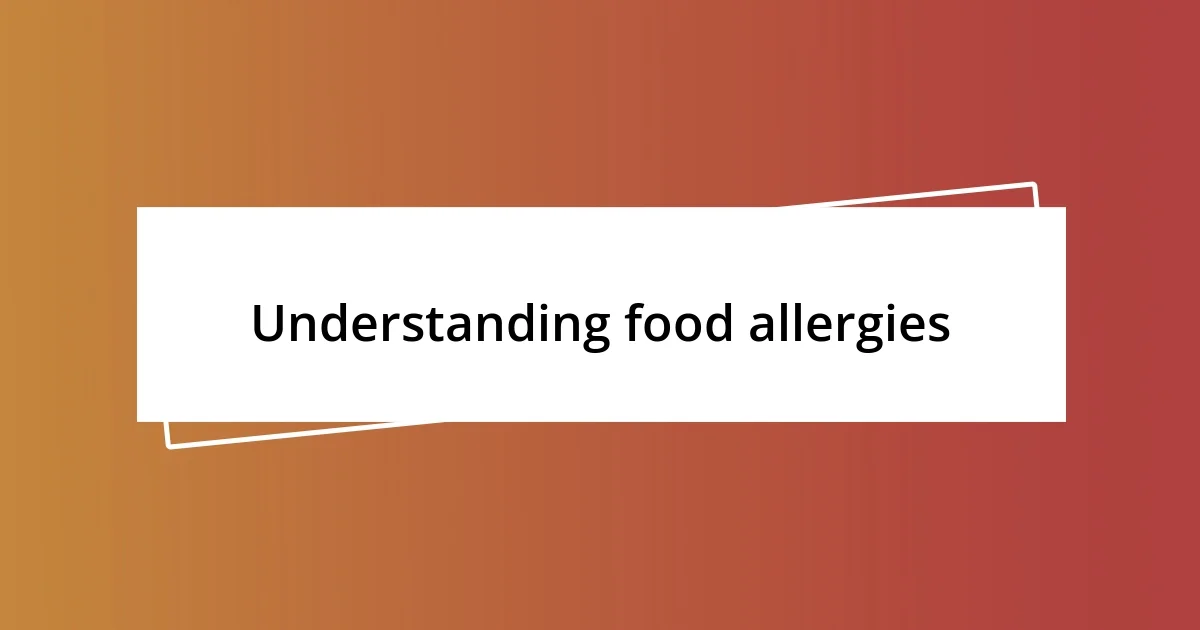
Understanding food allergies
Food allergies can feel like an overwhelming puzzle, one that impacts everyday life in significant ways. I still vividly remember the first time I realized something was off after eating a simple peanut butter sandwich—hives, swelling, and a rush to the emergency room. The sheer fear in that moment is something I wouldn’t wish on anyone. Have you ever experienced a sudden allergic reaction? It’s like your body is betraying you, and it leaves you questioning what you can and can’t trust anymore.
Understanding the mechanics behind food allergies is crucial. Allergies occur when the immune system incorrectly identifies a usually harmless substance as a threat, prompting an exaggerated response. For me, realizing that my body was misinterpreting common foods was a tough pill to swallow, especially since I had to navigate social situations where food was involved. Have you been in a similar spot, feeling left out at a gathering because of your allergies?
Moreover, different allergens can trigger various reactions, ranging from mild discomfort to life-threatening situations. Each person’s experience is unique, and sometimes it’s challenging to communicate that to others. I’ve encountered numerous instances where friends didn’t grasp the seriousness of my allergies, which left me feeling isolated despite their good intentions. This led me to wonder: how can we educate those around us to foster understanding and empathy? It’s essential for both those with allergies and their loved ones to engage in open conversations about these challenges.
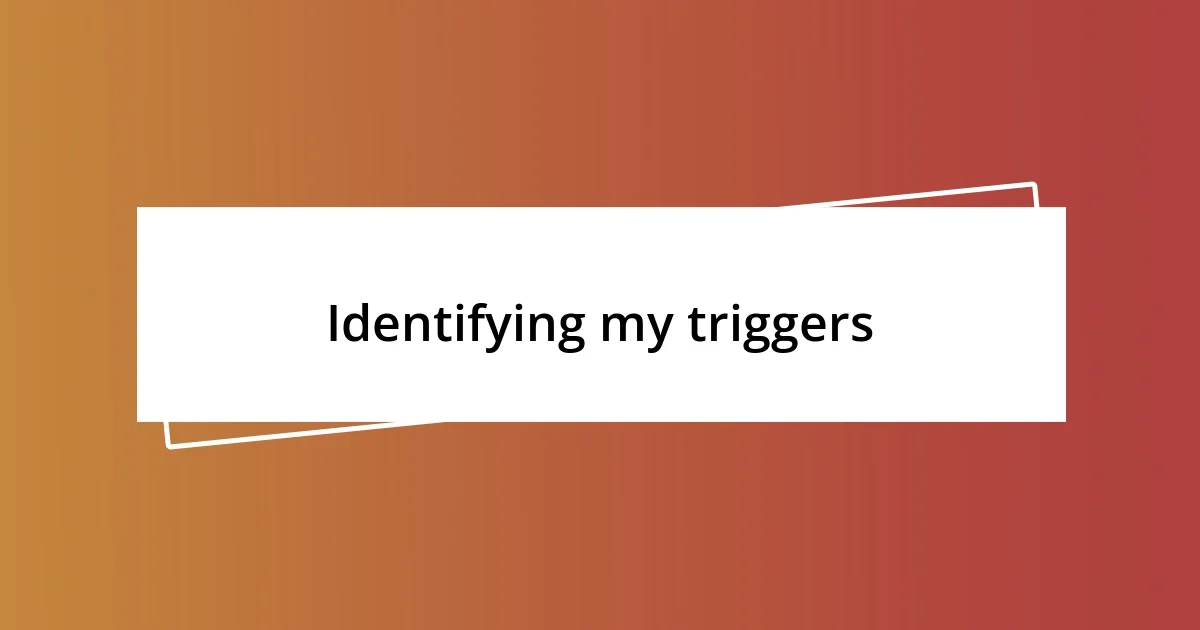
Identifying my triggers
Identifying my triggers was a journey filled with trials and errors. I remember sitting at my dining room table, methodically writing down everything I consumed for weeks while noting any adverse reactions. It felt tedious, but it was essential for understanding my body’s unique signals. By keeping track, I started to recognize patterns that helped me pinpoint specific food intolerances. Have you ever thought about how connecting the dots in your daily meals can lead to significant insights?
Over time, as I began to notice how my body reacted to certain foods, I learned to trust my instincts more. One evening, I decided to experiment with gluten-free options after feeling bloated and uncomfortable for days. The relief I felt the following morning was like a light bulb moment. That experience taught me that sometimes, experimenting within safe boundaries can uncover triggers I hadn’t even considered. Has trying something different ever led you to a surprising discovery?
My experience also taught me that triggers could be sneaky. For instance, I was always cautious about nuts, but I didn’t realize that processed foods containing traces of nuts could affect me too. It was an eye-opener, showing me the importance of reading labels meticulously. I started to feel empowered by asking detailed questions at restaurants, and I became an advocate for my health. This journey of identifying my triggers ultimately led me to embrace a proactive approach towards my food choices.
| Food Item | Reaction |
|---|---|
| Peanuts | Hives, swelling |
| Gluten | Bloating, fatigue |
| Shellfish | Itchy throat |
| Processed snacks | Stomach cramps |
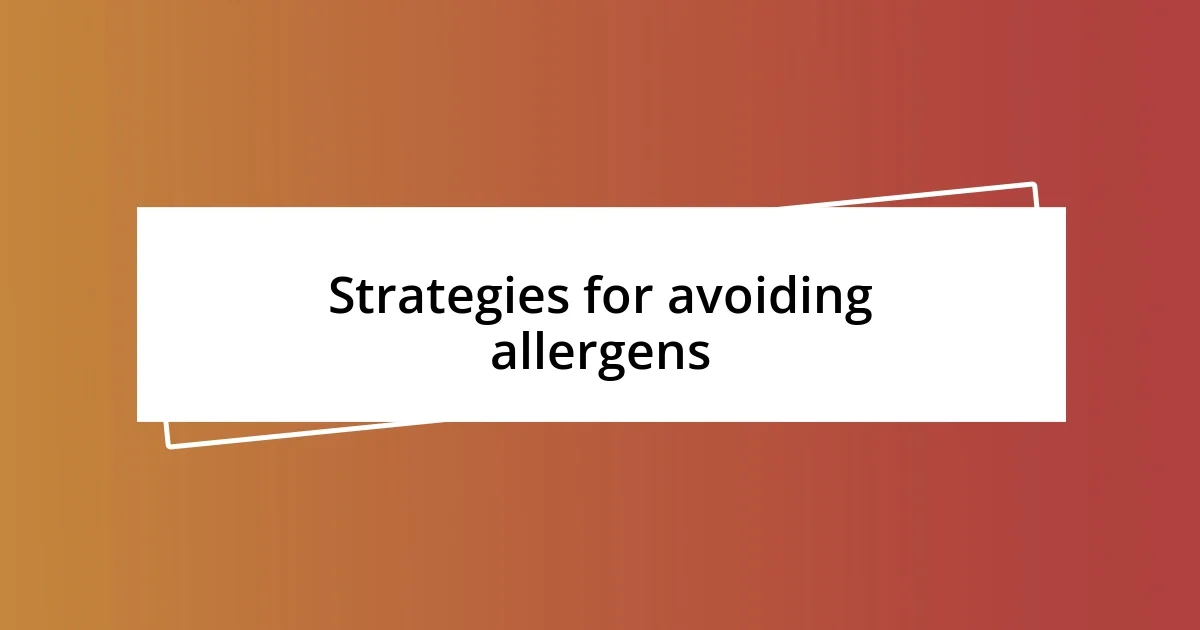
Strategies for avoiding allergens
Strategies for avoiding allergens can be both empowering and daunting. I’ve learned through experience that preparing ahead is key. Whenever I ventured out, I made it a point to pack my own snacks. I can’t tell you how many times this act saved me from anxiety about hidden allergens in unfamiliar food settings. Imagine walking into a party with your delicious allergen-free treats—it’s like carrying your own safety net.
Here are some practical strategies I’ve found effective:
- Read labels carefully: Always check ingredient lists for allergens, including potential cross-contaminants.
- Communicate openly: Inform friends, family, and restaurants about your allergies. A clear dialogue can help avoid mishaps.
- Cook at home: This gives you total control over what goes into your meals.
- Research restaurants: Look for establishments with allergy-friendly menus or those that prioritize food safety.
- Educate yourself and others: Share information and resources about food allergies to foster understanding and support.
I’ve also found that staying organized plays a crucial role in managing my allergies. I created a dedicated grocery list that highlighted safe foods, making shopping less overwhelming. It transformed a previously daunting task into a streamlined experience. There’s something incredibly reassuring about knowing I have safe options stocked at home. Such moments of control help me manage my anxiety and embrace the joys of cooking, which has turned into one of my favorite hobbies. Have you ever found that staying organized in an area of your life brought you unexpected peace?
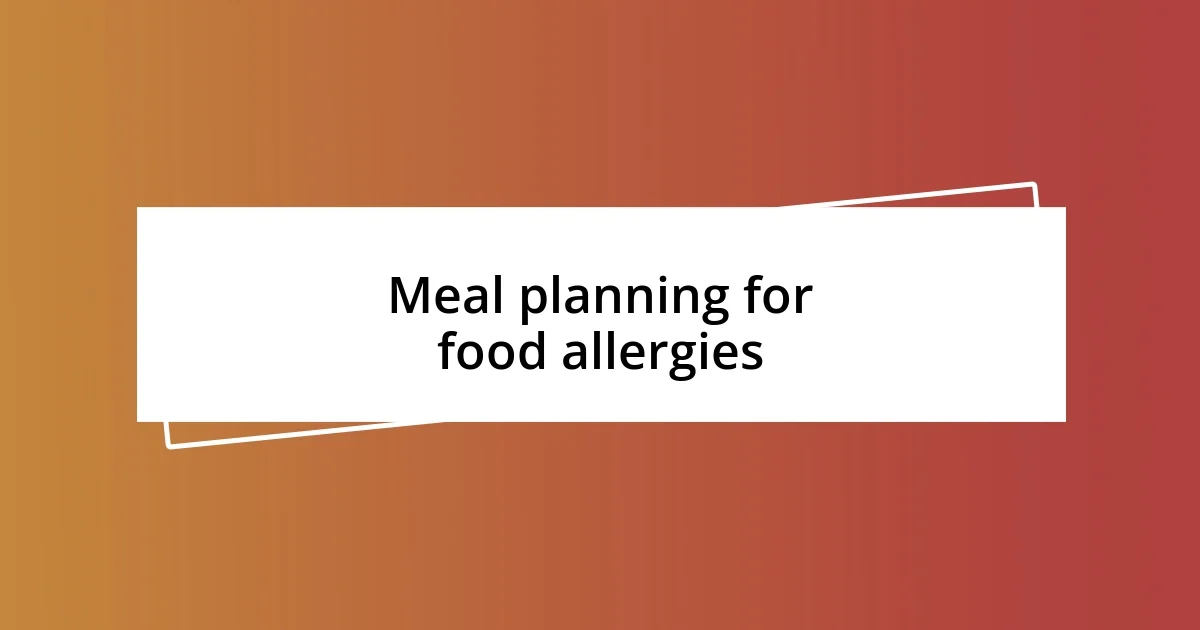
Meal planning for food allergies
Meal planning with food allergies has been a transformative process for me. I remember the early days when I would stare blankly at my fridge, feeling overwhelmed by the restrictions. One afternoon, while I was prepping for the week, I decided to map out my meals in advance. That evening, I created a simple chart, jotting down safe ingredients and pairing them into delicious combinations. It was so satisfying to see my meals laid out like a colorful puzzle, each piece thoughtfully chosen to keep allergens at bay. Have you ever experienced the relief of a well-structured plan when navigating something as complex as allergies?
One key element in my meal planning is batch cooking. I can’t emphasize how much time it saves me. On Sundays, I dedicate a few hours to prepare meals that I can freeze or refrigerate for the week ahead. Last winter, I made a big pot of tomato soup with dairy-free cream, and I found myself enjoying it for lunch throughout rainy days. Not only did it keep me on track with my diet, but it also provided a comforting staple, making my week feel cozy and organized. Does anyone else find comfort in a warm dish that’s both tasty and safe?
Lastly, I’ve come to appreciate the role of creativity in meal planning. Cooking has morphed from a chore to a delightful hobby for me. I often experiment with new recipes that fit my dietary needs, like my quinoa salad with bright, colorful veggies and a tangy dressing. The process of discovering new flavors while ensuring they’re safe has turned my kitchen into a playground. What about you? Have you ever found joy in reimagining a favorite dish by swapping out ingredients to keep it allergy-friendly?
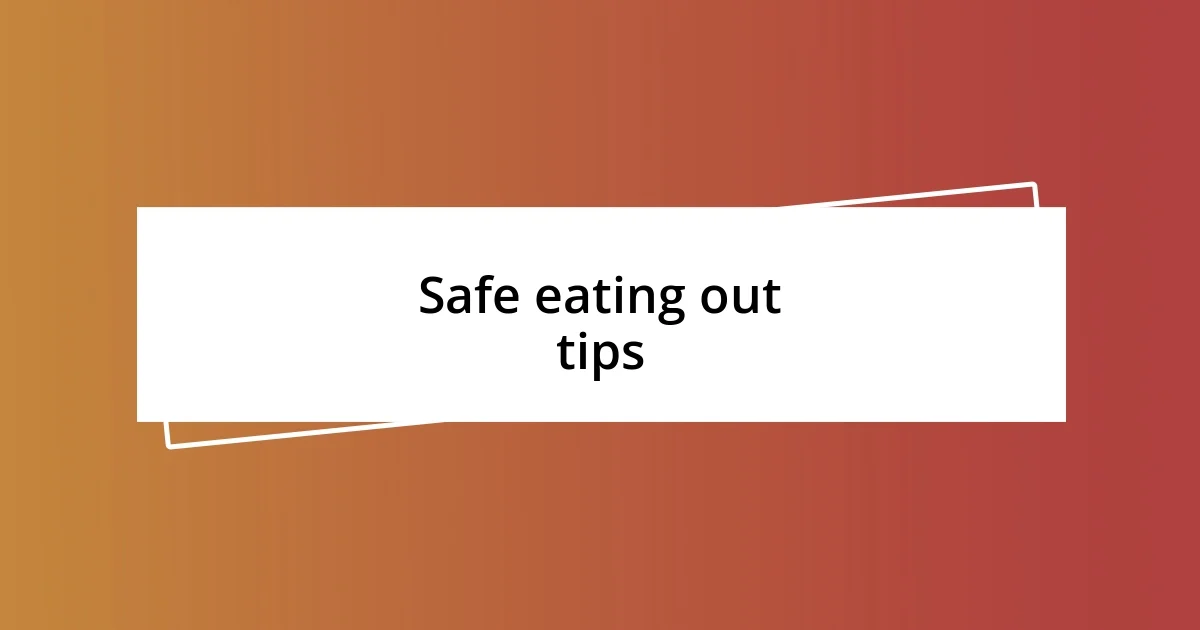
Safe eating out tips
When it comes to safe eating out, I’ve learned that researching menus ahead of time really pays off. Just last week, I went to a new Italian restaurant, and instead of scanning the entire menu once I got there, I looked it up online beforehand. It helped me narrow down my options to dishes that were free of my allergens. Have you ever noticed how a little preparation can ease the stress of dining out?
Once at the restaurant, I never shy away from asking questions. I remember a dinner where I inquired about the ingredients in a sauce, and the waiter was surprisingly receptive. My curiosity not only educated me about the dish but also alerted the staff about my allergies. It’s amazing how a simple conversation can turn a potentially anxious experience into a positive one. Have you ever felt empowered by speaking up about your needs in a dining situation?
Lastly, I’ve found that it’s crucial to trust your instincts when selecting a place to eat. If a restaurant doesn’t seem knowledgeable about food allergies, I don’t hesitate to walk away. After a less-than-stellar experience at a crowded burger joint that seemed indifferent about cross-contamination, I learned that prioritizing my health means choosing establishments that truly understand and accommodate my needs. Isn’t it worth it to find a restaurant where you feel safe and welcome?
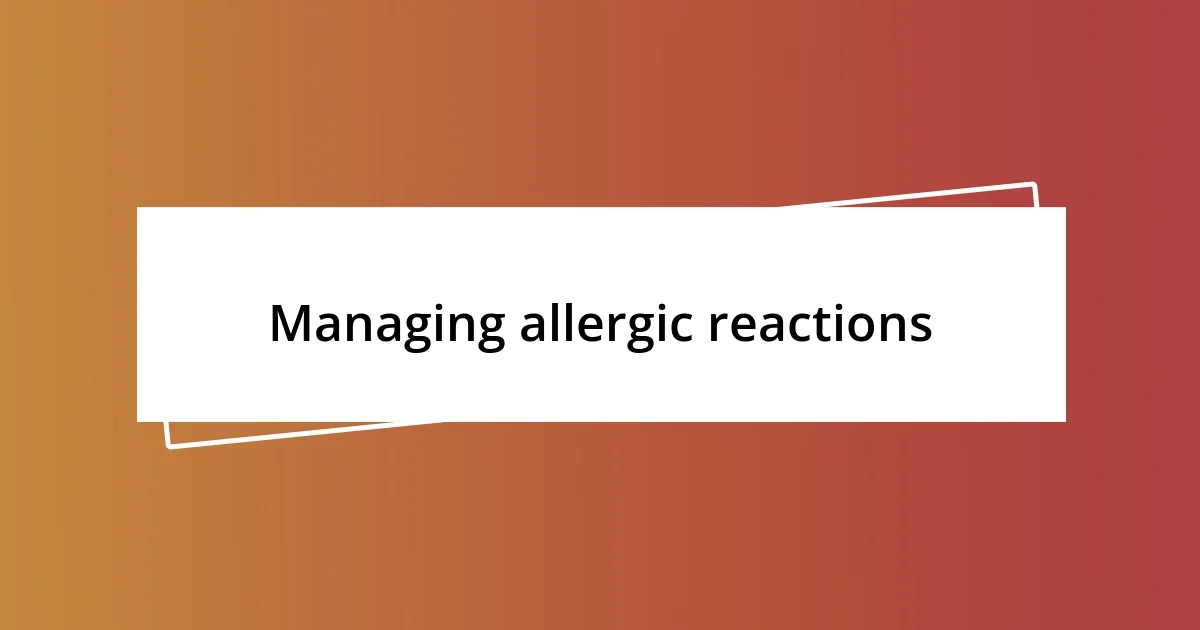
Managing allergic reactions
When faced with an allergic reaction, staying calm is my top priority. I’ve had moments where my throat felt tight, and panic was setting in, but taking deep breaths has helped ground me. Remembering to always carry my emergency medication, like an epinephrine auto-injector, has been a game changer. Have you ever found strength in a routine that reassures you in stressful situations?
After a couple of close calls, I made it a habit to share my allergy information with friends and family. Whether we’re heading out for a birthday dinner or planning a potluck, I take a moment to explain my allergies. It’s incredible how much support I’ve received just by opening up. Has sharing your situation ever transformed the way others view food safety around you?
Learning to recognize early warning signs of an allergic reaction has also been crucial. I’ve often felt the initial itch in my mouth or a mysterious sense of unease. Now, I take these signals seriously and act swiftly. The key to managing reactions is understanding your unique triggers and being proactive. Has paying attention to your body ever changed your approach to wellbeing?
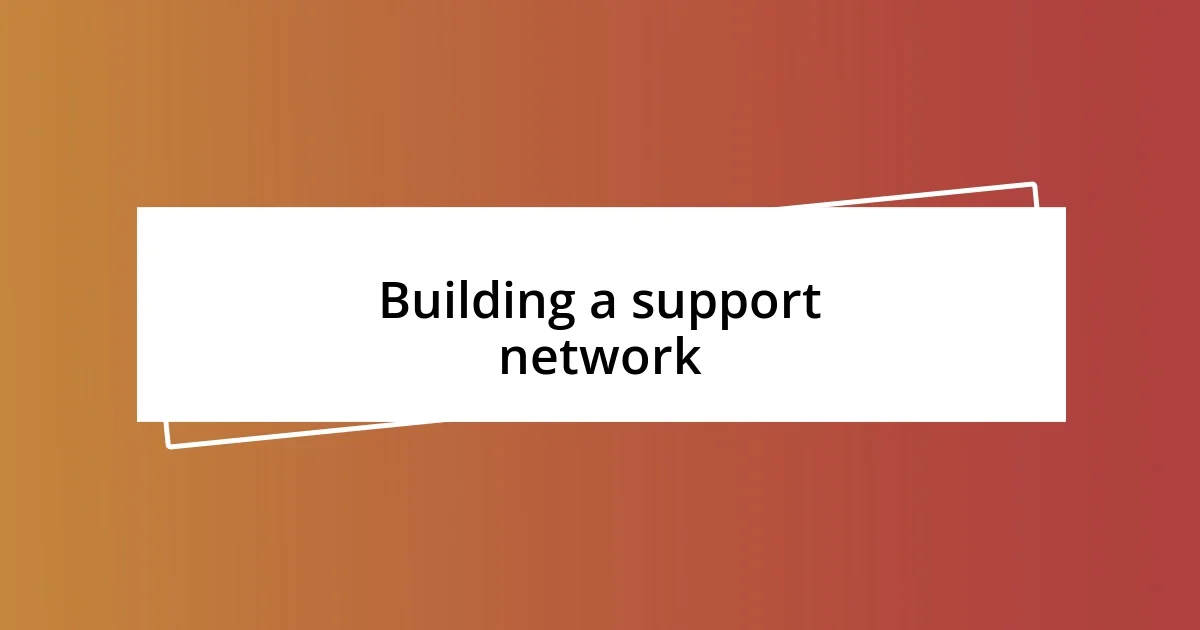
Building a support network
Building a support network around food allergies has been essential for me. When I first opened up to my close friends about my allergies, I was relieved to discover how eager they were to help. They began to read labels when we shopped together and even took the initiative to ask about ingredients at restaurants. Have you ever felt a sense of relief when friends or family rally around you?
I also found online communities to be invaluable. Joining forums and social media groups dedicated to food allergies opened up a new world of support. I remember one instance where I shared a recipe modification for a beloved dish, and the response was overwhelmingly positive. I felt empowered knowing I could contribute to a shared experience, but it was the heartfelt stories shared by others that truly resonated. Isn’t it amazing how a collective voice can elevate personal challenges?
Furthermore, having a strong relationship with healthcare professionals made a difference too. I keep in close contact with my allergist, and they’re always available to answer my questions. Just last month, I reached out for advice on dining out at a wedding, and their insights eased my concerns. Have you ever felt that added layer of security knowing a trusted expert is in your corner?












